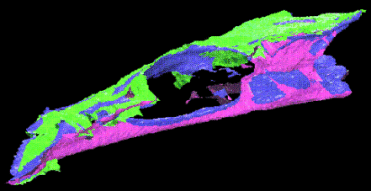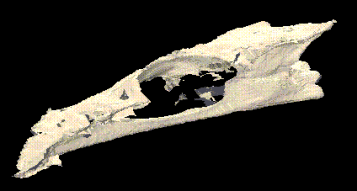

The Latest Raytracing Results
Raytracing with POV-Ray
I have now taken range maps scanned with the new sensor, converted the raw sensor data into portable range map format (a 2-D array of [x,y,z] vectors), and then raytraced the range map using POV-Ray (tm) version 3.00b. I have also raytraced a series of images, ready for animation, showing a range map suspended in space as the camera "flies" around it.
The results below use the GCRL 26666 specimen. Some scans downsample by two, meaning only every other line and column of the original range map were used, in order to reduce the number of triangular facets by a factor of approximately four. The downsampled images "look less noisy," for whatever that's worth. It probably depends on the relative sizes of a typical facet and one pixel at these image dimensions. Two possible fixes:
- Use a larger image size (increases raytrace time as the square of image width).
- Oversample (increases raytrace time linearly with oversampling rate).
Steps
Converted raw sensor data to portable range map format
with eod-to-xyz.
Converted the portable range map to POV-Ray format
with xyz-to-pov.
Raytraced with POV-Ray. Statistics for one 2x downsampled lateral view dataset:
Computer: 66 MHz 486, 32 MB RAM, running Linux v2.0.27.
22,126 triangular facets
POV file: 1,489,013 bytes
Image size: 480 x 360
--------------------------------------------------------------------
Time For Parse: 0 hours 1 minutes 40.0 seconds (100 seconds)
Time For Trace: 0 hours 1 minutes 29.0 seconds (89 seconds)
Total Time: 0 hours 3 minutes 9.0 seconds (189 seconds)
146.690u 1.120s 3:10.34 77.6% 0+0k 0+0io 558pf+0w
--------------------------------------------------------------------
Initial Results
GCRL 26666, dorsal view, no downsampling (notice it's a bit grainy....)

GCRL 26666, lateral view, 2x downsampling.

GCRL 26666, ventral view, 2x downsampling.
